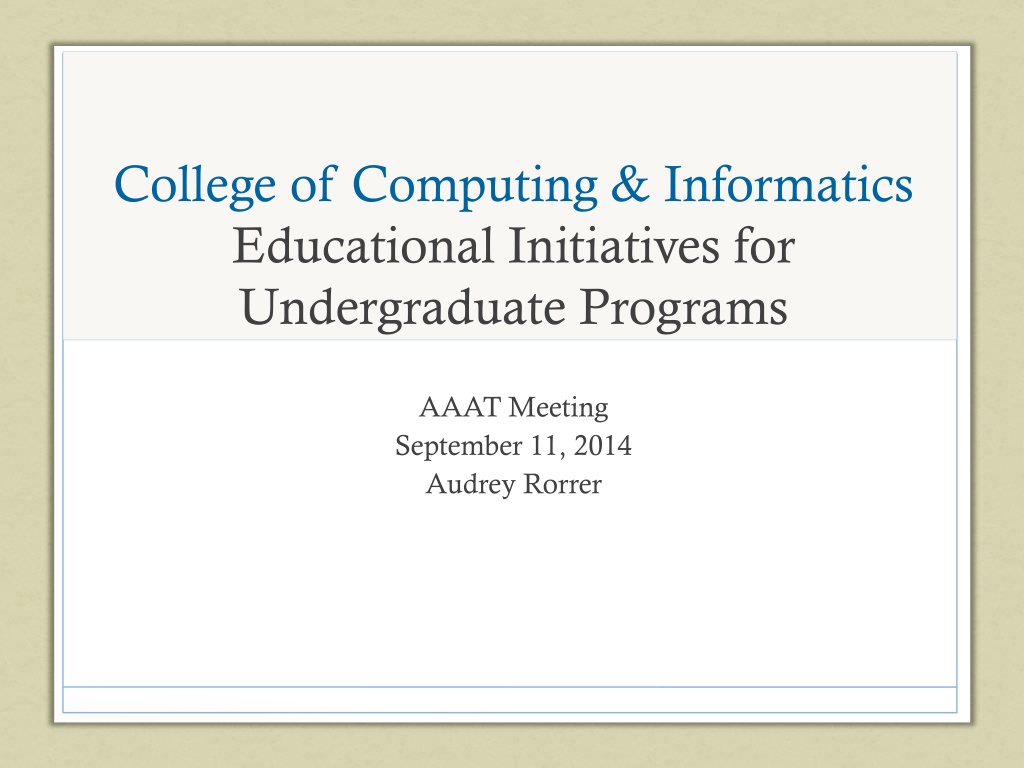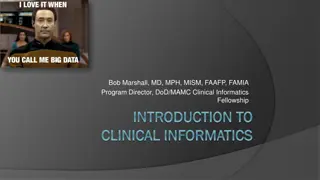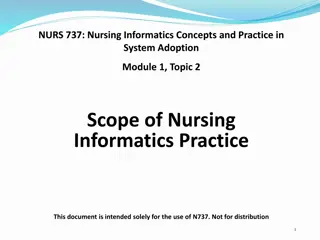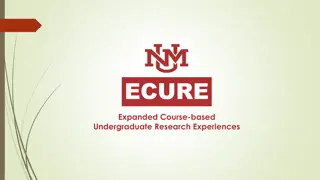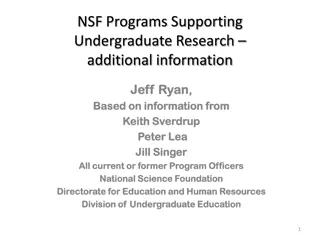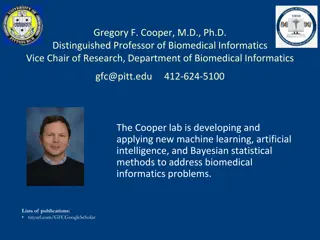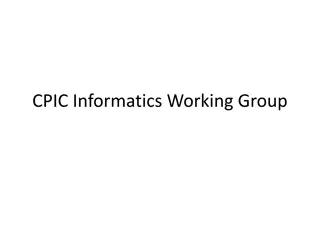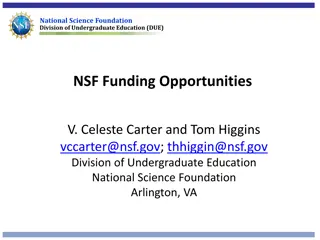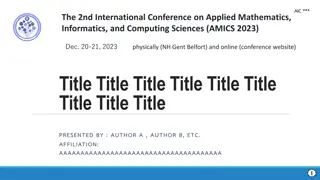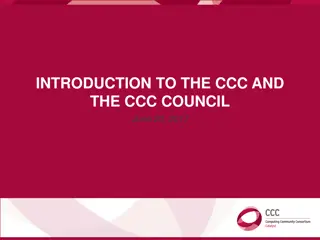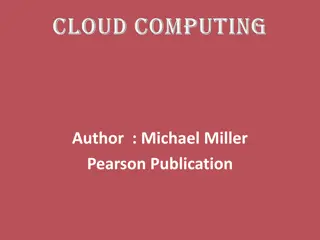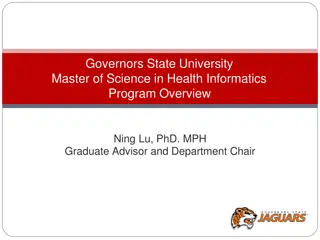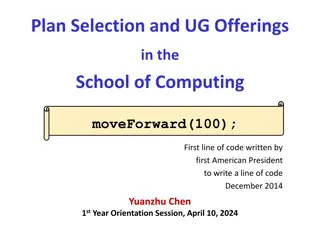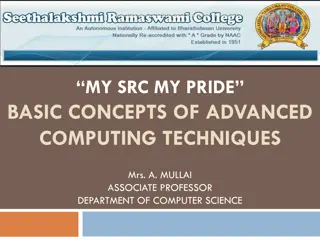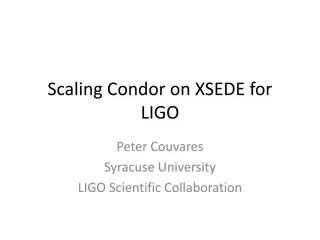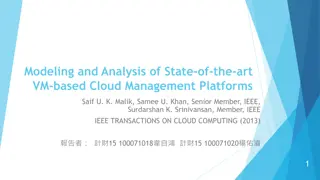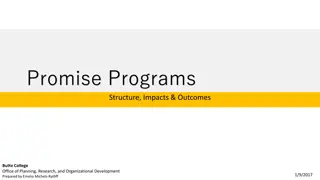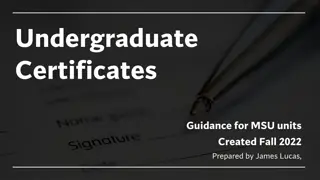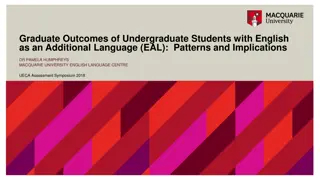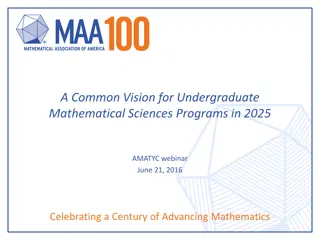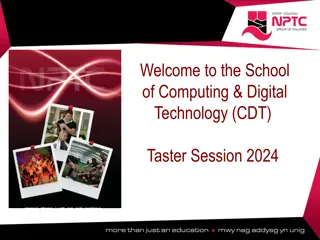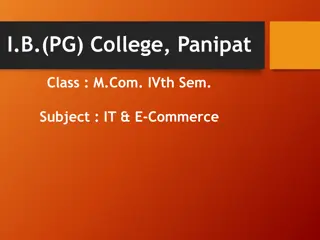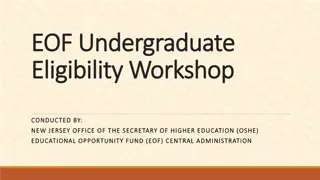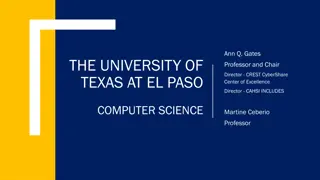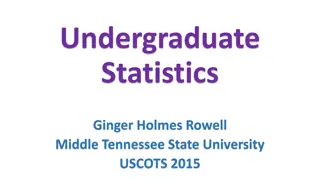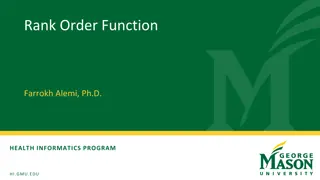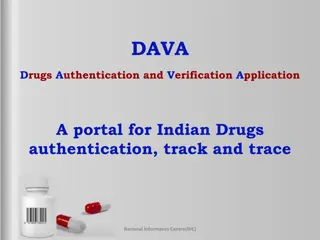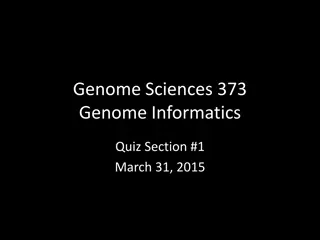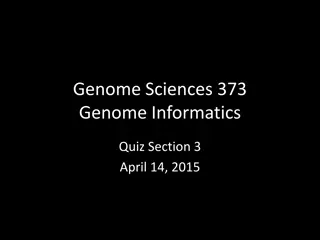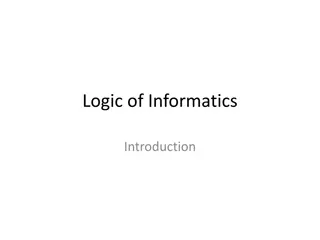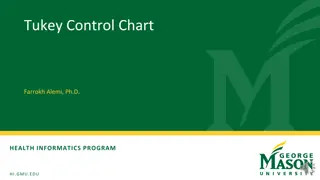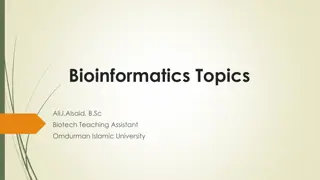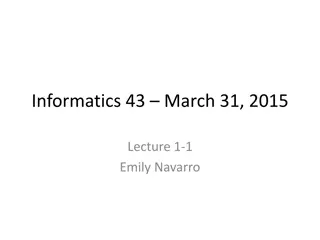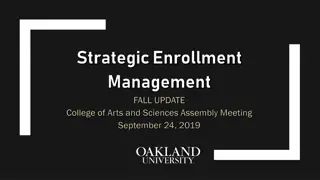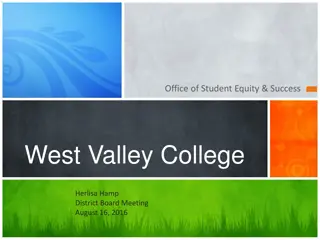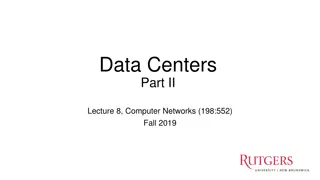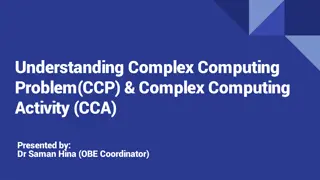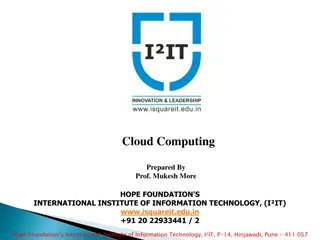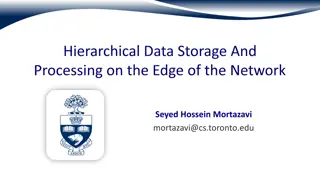Educational Initiatives in College of Computing & Informatics Undergraduate Programs
Overview of challenges, solutions, and key initiatives discussed in the AAAT meeting on September 11, 2014, focusing on promoting diversity, retention, and graduation rates in the field of computing. The educational strategies include implementing flipped classrooms, engaging with industry professionals, and assessing student outcomes to enhance program effectiveness.
Download Presentation

Please find below an Image/Link to download the presentation.
The content on the website is provided AS IS for your information and personal use only. It may not be sold, licensed, or shared on other websites without obtaining consent from the author. Download presentation by click this link. If you encounter any issues during the download, it is possible that the publisher has removed the file from their server.
E N D
Presentation Transcript
College of Computing & Informatics Educational Initiatives for Undergraduate Programs AAAT Meeting September 11, 2014 Audrey Rorrer
Overview Context: Challenges and Solutions Assessment Process Examples and Preliminary Results Lessons Learned Future Directions
CCI Challenges & Solutions Challenge Pipeline Retention Graduation Concerns: Limited discipline exposure in High School Image of computing Low diversity <20% nationally Concerns: Entry level course DFWs Climate: peer and faculty approachability Concerns: Time to graduation Transfer student credits UNIFIED DEGREE Solution Focus: Social relevance and interdisciplinary campaign Center for Education Innovation Focus: Computing Professionals courses (Prospect for Success) Teaching Initiatives: engagement, pathways, course splits Focus: Degree maps Prospect for Success for transfer students The T Shaped Professional 3
Key Educational Initiatives 1212 Split/4 credits Flipped Classrooms Engagement: CS Professionals Pathways
CCI Assessment Feedback Loop Implement Assess & Analyze Review & Act Check & Recommend
Overall Assessment Measures & Cycle Fall & Spring Descriptive Data Counts of enrollment, graduation, exits by program; levels, transfer status, credit hours; incoming FTFTF* student traits (gpa, pgi, etc.) Semester Benchmark Data Retention and graduation rates (4,5,6 yr) of FTFTF* by program Student Learning Outcomes by program Annual Education Initiatives: 1212 Split + 4 credits; Flipped Courses, Pathways, Engagement Overall changes in Descriptive and Benchmark Data DFWs/As/BCs in initiative courses, student surveys (CCI + Student Affairs) Ongoing *FTFTF = first time full time freshmen
Educational Initiatives Targeted Data Measures Education Initiatives Method 1212 Split/4 credit Flipped Classroom (ITIS 1212 & 2300) - - - - Count and % of DFWs, As, B/Cs Performance in ITCS 1213 Student Learning Outcomes Comparative study - Changes in course outcomes (pre- baseline vs post- implementation) Retention & Graduation - Pathways - - Course load averages by level, transfer status Graduation rates at 4,5,6 years - Changes over time (repeated measures) Retention & Graduation - Engagement (ITCS 1600, 2600) - Count of internships & REUs; change over time Survey (Academic/career intentions, attitudes) Retention for FTFTF Graduation rates at 4,5,6 years Prospect for Success Student Learning Outcomes - - In course surveys (pre/post) Pre-Advising Survey (academic year 2012-13 baseline) Senior survey (EASE- longitudinal) Retention & Graduation - - - - - -
Preliminary Indicators Currently in 2nd fall term of implementation Working with IR to investigate course outcomes in consecutive courses Engagement: Prospect for Success 1212 Split By Dept. By Calculus 4 credits Flipped Courses Pathways Graduation rate trends Credit hours Advising
Computing Professionals Educational Initiatives
Engagement Courses ITCS 1600 Computing Professionals ITCS 2600 Computing Professionals II Weekly large group seminar series Weekly small group peer-led activities Required out-of-class participation The T-Shaped Professional
Engagement Study of 1600 Hypothesis: Engagement will increase student sense of belonging, self-efficacy, coping skills, professional identity Study Design: Mixed- Methods Pre/post survey [likert type scales, constructs] Focus groups and interviews to corroborate survey findings Prospect for Success Fall 2011 Spring 2012 Fall 2012 Spring 2013 Fall 2013 Fall 2014 Formative
Focus Groups & Interviews Course helped students make friends Helps students understand value of obtaining discipline related experiences Course activities help student learn about campus support Fall Terms 2011, 2012; Spring 2012, 2013 [total N=35]
Engagement Survey Results Each Term Spring 2013: Climate was significantly higher at post (U=89.5, p=.037) Construct Climate Pre Mean Rank 19.3 Post Mean Rank 28.55 Overall Positive Descriptive Outcomes [Spring 2012-Spring 2013] Pre Post Additional Items Are you interested in an undergraduate research opportunity? 52% 58% 58% Are you interested in an internship or co-op? 82% 87% 87%
Flipped Courses Educational Initiatives
Flipped Classrooms Study Post-Survey; 7 point Likert scale and 3 Open-Ended items
Flipped Classroom Responses Themes from Open Ended Comments: Students Liked Interactivity/Hands-on Learning: I liked the fact that it was more hands-on than other classes. Being able to work with people is the highlight of this course. I liked how the lab actually helped me learn in the class and all of the videos were helpful. A few negative sentiments: Time spent outside of the classroom watching videos made me feel like the class was online.
Lessons Learned and Future Directions Lessons Learned Future Directions Mixed-methods complete the picture Strategic Planning Unified Degree Survey restraint Leverage existing resources Widespread marketing Learning Analytics
Engagement Survey Constructs and Sample Items Computing Self-Efficacy I can complete the programming requirements for a computing/IT major Help-Seeking/Coping Skills When I do poorly on an exam, I try to come up with a strategy about what to do Climate Degree of interaction with faculty and students I can relate to the people around me in my classes Professional Identity I feel that I "fit" in the field of computing/IT I know the type of skills I need to be a successful computing/IT student in college and in my future career
Engagement Statistical Analysis Mann-Whitney Test for Each Semester Small sample sizes in post responses, non-parametric approach was used. Limitation Small number of post survey responses Self-report, sample bias Unknown confounds
2,039 Fall 2014 CCI Fall Enrollment by Degree Program 1800 1600 1579 1400 1393 1317 IT-PhD CIS-PhD 1200 1181 BiG-PhD 1109 IT-MS 1000 959 HI-PSM CS-MS 800 BiG-MS SIS-UG CS-UG 600 Total Enrollment Certificates 400 200 0 Fall 2008 Fall 2009 Fall 2010 Fall 2011 Fall 2012 Fall 2013
Degrees Awarded by Program UG CS UG SIS MS BiG MS CS MS IT PhD BiG PhD CIS PhD IT Total Degrees 298 291 0 7 21 9 4 2 32 39 234 12 214 2 198 19 32 63 186 11 101 5 37 31 6 35 57 5 73 8 66 63 70 62 62 5 31 44 39 92 73 62 61 43 37 '2007-08 2008-09 2009-10 2010-11 2011-12 2012-13
